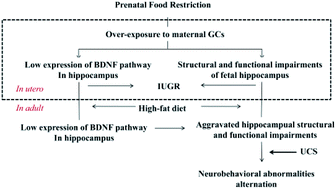当前位置:
X-MOL 学术
›
Toxicol. Res.
›
论文详情
Our official English website, www.x-mol.net, welcomes your feedback! (Note: you will need to create a separate account there.)
Prenatal food restriction induces neurobehavioral abnormalities in adult female offspring rats and alters intrauterine programming†
Toxicology Research ( IF 2.1 ) Pub Date : 2018-01-22 00:00:00 , DOI: 10.1039/c7tx00133a Bo He 1, 2, 3, 4, 5 , Dan Xu 1, 2, 3, 4, 5 , Chong Zhang 1, 2, 3, 4 , Li Zhang 1, 2, 3, 4 , Hui Wang 1, 2, 3, 4, 5
Toxicology Research ( IF 2.1 ) Pub Date : 2018-01-22 00:00:00 , DOI: 10.1039/c7tx00133a Bo He 1, 2, 3, 4, 5 , Dan Xu 1, 2, 3, 4, 5 , Chong Zhang 1, 2, 3, 4 , Li Zhang 1, 2, 3, 4 , Hui Wang 1, 2, 3, 4, 5
Affiliation

|
The higher risk of adult neuropsychiatric diseases in individuals with low fetal birth weight may be related to brain-derived neurotrophic factor (BDNF) signaling pathway inhibition. Here, we investigated whether prenatal food restriction (PFR) induces neurobehavioral alterations in adult female offspring and explored the underlying intrauterine programming mechanism. Pregnant Wistar rats in the PFR group were fed 50% of the daily food intake of control rats from gestational day (GD) 11 to 20; some pregnant rats were sacrificed at GD20, and the remaining female pups had normal delivery and were fed a post-weaning high-fat diet (HFD) and half of them were exposed to an unpredictable chronic stress (UCS) from postnatal week (PW) 21. All adult female offspring were sacrificed at PW24. At GD20, PFR altered fetal hippocampal structure and function, increased glucocorticoid receptor (GR) expression, and decreased mineralocorticoid receptor (MR), BDNF and synaptic plasticity-related gene expressions. At PW24, PFR induced depression-like behavioral abnormalities in adult rat offspring fed an HFD. These rats exhibited depression- and anxiety-like behavioral changes after HFD/UCS. Furthermore, the hippocampal morphology of the PFR group showed abnormal changes in adult offspring fed an HFD and more serious damage after HFD/UCS. These changes were accompanied by increased serum corticosterone levels, elevated GR expression, and reduced expression of the BDNF signaling pathway and synaptic plasticity-related genes in the hippocampus. In conclusion, PFR may induce neurobehavioral abnormalities in adult offspring, especially those exposed to UCS, through high levels of glucocorticoids, which increase hippocampal GR expression and decrease BDNF expression.
中文翻译:

产前食物限制导致成年雌性后代大鼠的神经行为异常并改变子宫内程序设计†
胎儿出生体重低的个体中成人神经精神疾病的较高风险可能与脑源性神经营养因子(BDNF)信号通路抑制有关。在这里,我们调查了产前食物限制(PFR)是否在成年雌性后代中诱发神经行为改变,并探讨了潜在的子宫内编程机制。PFR组的怀孕Wistar大鼠从妊娠第11天到20天,饲喂对照大鼠每日食物摄入量的50%。在GD20处死了一些怀孕的大鼠,其余的雌性幼崽分娩正常,接受了断奶后高脂饮食(HFD),其中一半从产后一周(PW)暴露于不可预测的慢性应激(UCS)中21.所有成年雌性后代在PW24处死。在GD20,PFR改变了胎儿海马的结构和功能,增加糖皮质激素受体(GR)的表达,并降低盐皮质激素受体(MR),BDNF和突触可塑性相关基因的表达。在PW24时,PFR诱导了喂食HFD的成年大鼠后代的抑郁样行为异常。这些大鼠在HFD / UCS后表现出抑郁和焦虑样的行为变化。此外,PFR组的海马形态显示,喂食HFD的成年后代有异常变化,而HFD / UCS造成的损害更严重。这些变化伴随着血清皮质酮水平的升高,GR表达的升高以及海马区BDNF信号通路和突触可塑性相关基因表达的降低。总之,PFR可能通过高水平的糖皮质激素诱导成年后代(尤其是暴露于UCS的后代)的神经行为异常,
更新日期:2018-01-22
中文翻译:

产前食物限制导致成年雌性后代大鼠的神经行为异常并改变子宫内程序设计†
胎儿出生体重低的个体中成人神经精神疾病的较高风险可能与脑源性神经营养因子(BDNF)信号通路抑制有关。在这里,我们调查了产前食物限制(PFR)是否在成年雌性后代中诱发神经行为改变,并探讨了潜在的子宫内编程机制。PFR组的怀孕Wistar大鼠从妊娠第11天到20天,饲喂对照大鼠每日食物摄入量的50%。在GD20处死了一些怀孕的大鼠,其余的雌性幼崽分娩正常,接受了断奶后高脂饮食(HFD),其中一半从产后一周(PW)暴露于不可预测的慢性应激(UCS)中21.所有成年雌性后代在PW24处死。在GD20,PFR改变了胎儿海马的结构和功能,增加糖皮质激素受体(GR)的表达,并降低盐皮质激素受体(MR),BDNF和突触可塑性相关基因的表达。在PW24时,PFR诱导了喂食HFD的成年大鼠后代的抑郁样行为异常。这些大鼠在HFD / UCS后表现出抑郁和焦虑样的行为变化。此外,PFR组的海马形态显示,喂食HFD的成年后代有异常变化,而HFD / UCS造成的损害更严重。这些变化伴随着血清皮质酮水平的升高,GR表达的升高以及海马区BDNF信号通路和突触可塑性相关基因表达的降低。总之,PFR可能通过高水平的糖皮质激素诱导成年后代(尤其是暴露于UCS的后代)的神经行为异常,



























 京公网安备 11010802027423号
京公网安备 11010802027423号